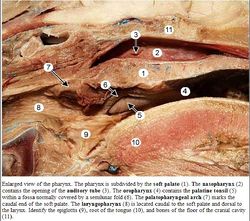Difference between revisions of "Oropharynx - Anatomy & Physiology"
m (Text replace - "Category:To Do - Review" to "Category:To Do - AP Review") |
|||
| (15 intermediate revisions by 3 users not shown) | |||
| Line 1: | Line 1: | ||
| + | {{OpenPagesTop}} | ||
==Introduction== | ==Introduction== | ||
| − | The [[Pharynx - Anatomy & Physiology|pharynx]] is the chamber connecting the [[Oral Cavity Overview - Anatomy & Physiology|oral cavity]], [[Nasal Cavity - Anatomy & Physiology|nasal cavity]], [[Oesophagus - Anatomy & Physiology|oesophagus]] and [[Larynx - Anatomy & Physiology|larynx]]. The [[Pharynx - Anatomy & Physiology|pharynx]] is divided into the | + | The [[Pharynx - Anatomy & Physiology|pharynx]] is the chamber connecting the [[Oral Cavity Overview - Anatomy & Physiology|oral cavity]], [[Nasal Cavity - Anatomy & Physiology|nasal cavity]], [[Oesophagus - Anatomy & Physiology|oesophagus]] and [[Larynx - Anatomy & Physiology|larynx]]. The [[Pharynx - Anatomy & Physiology|pharynx]] is divided into the nasopharynx, oropharynx and [[Larynx - Anatomy & Physiology#Laryngeal Pharynx|laryngeal pharynx]] which all have different functions, innervation and develop differently. The oropharynx is the oral section of the [[Pharynx - Anatomy & Physiology|pharynx]]. |
[[Image:Pharynx Anatomy.jpg|thumb|right|250px|Pharynx Labelled - Copyright C.Clarkson and T.F.Fletcher University of Minnesota]] | [[Image:Pharynx Anatomy.jpg|thumb|right|250px|Pharynx Labelled - Copyright C.Clarkson and T.F.Fletcher University of Minnesota]] | ||
==Structure and Function== | ==Structure and Function== | ||
| − | The last molar borders rostrally and the [[Epiglottis]] caudally. The [[Tongue - Anatomy & Physiology|tongue]] borders ventrally and the [[Soft Palate|soft palate]] dorsally. It is derived from endoderm. | + | The last molar borders rostrally and the [[Larynx - Anatomy & Physiology#Epiglottis|epiglottis]] caudally. The [[Tongue - Anatomy & Physiology|tongue]] borders ventrally and the [[Soft Palate|soft palate]] dorsally. It is derived from endoderm. |
The oropharynx is innervated by the '''glossopharyngeal nerve''' ([[Cranial Nerves - Anatomy & Physiology|CN IX]]). It is divided by the '''glossopalatine arch''' from the [[Larynx - Anatomy & Physiology#Laryngeal Pharynx|laryngeal pharynx]]. | The oropharynx is innervated by the '''glossopharyngeal nerve''' ([[Cranial Nerves - Anatomy & Physiology|CN IX]]). It is divided by the '''glossopalatine arch''' from the [[Larynx - Anatomy & Physiology#Laryngeal Pharynx|laryngeal pharynx]]. | ||
| + | |||
| + | ==Histology== | ||
| + | |||
| + | The oropharynx has a '''stratified squamous epithelium'''. It is keratinised in ruminants. The '''lamina propria''' contains aggregates of lymphoid tissue (called tonsils) in several parts of the oropharynx. | ||
==Musculature== | ==Musculature== | ||
| Line 26: | Line 31: | ||
Muscles from the pharyngeal arch are innervated by the '''vagus nerve''' ([[Cranial Nerves - Anatomy & Physiology|CN X]]). The stylopharyngeus from the pharyngeal arch is innervated by the '''glossopharyngeal nerve''' ([[Cranial Nerves - Anatomy & Physiology|CN IX]]). | Muscles from the pharyngeal arch are innervated by the '''vagus nerve''' ([[Cranial Nerves - Anatomy & Physiology|CN X]]). The stylopharyngeus from the pharyngeal arch is innervated by the '''glossopharyngeal nerve''' ([[Cranial Nerves - Anatomy & Physiology|CN IX]]). | ||
| − | == | + | {{Template:Learning |
| − | + | |quiz = [[Oropharyngeal anatomy]] | |
| − | + | |flashcards = [[Oropharynx Anatomy & Physiology Flashcards]] | |
| + | |Vetstream = [https://www.vetstream.com/canis/Content/Illustration/ill50412.asp Oropharynx Stick injury] | ||
| + | }} | ||
| − | + | {{OpenPages}} | |
[[Category:Oral Cavity - Anatomy & Physiology]] | [[Category:Oral Cavity - Anatomy & Physiology]] | ||
| − | |||
Latest revision as of 10:13, 7 May 2016
Introduction
The pharynx is the chamber connecting the oral cavity, nasal cavity, oesophagus and larynx. The pharynx is divided into the nasopharynx, oropharynx and laryngeal pharynx which all have different functions, innervation and develop differently. The oropharynx is the oral section of the pharynx.
Structure and Function
The last molar borders rostrally and the epiglottis caudally. The tongue borders ventrally and the soft palate dorsally. It is derived from endoderm.
The oropharynx is innervated by the glossopharyngeal nerve (CN IX). It is divided by the glossopalatine arch from the laryngeal pharynx.
Histology
The oropharynx has a stratified squamous epithelium. It is keratinised in ruminants. The lamina propria contains aggregates of lymphoid tissue (called tonsils) in several parts of the oropharynx.
Musculature
Constrictors
The constrictor muscles include the hyopharyngeus, thyropharyngeus and cricopharyngeus.
Dilators
The dilator muscle is the stylopharyngeus.
The pterygopharyngeus muscle shortens the oropharynx and the palatopharyngeus muscle closes the pharyngeal arch.
Innervation
Muscles from the pharyngeal arch are innervated by the vagus nerve (CN X). The stylopharyngeus from the pharyngeal arch is innervated by the glossopharyngeal nerve (CN IX).
| Oropharynx - Anatomy & Physiology Learning Resources | |
|---|---|
To reach the Vetstream content, please select |
Canis, Felis, Lapis or Equis |
 Multiple choice quizzes |
Oropharyngeal anatomy |
 Test your knowledge using flashcard type questions |
Oropharynx Anatomy & Physiology Flashcards |
Error in widget FBRecommend: unable to write file /var/www/wikivet.net/extensions/Widgets/compiled_templates/wrt6759fe7682eee5_01696074 Error in widget google+: unable to write file /var/www/wikivet.net/extensions/Widgets/compiled_templates/wrt6759fe7687d239_83978905 Error in widget TwitterTweet: unable to write file /var/www/wikivet.net/extensions/Widgets/compiled_templates/wrt6759fe768d8d13_23916423
|
| WikiVet® Introduction - Help WikiVet - Report a Problem |
